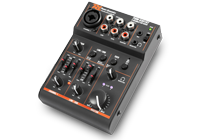What is a studio mixing console?
Briefly, a studio mixing desk is a hub that receives multiple input signals from other devices so that the audio can be modified. Those signals are then sent to an output ready for recording and broadcasting. They are essential in a studio setting, as the level of control you have over the sound mostly relies on the mixer, so running a studio without one is counterproductive.
In a studio setting, you will most likely be recording speech. If so, you would want to be using a condenser microphone, as they are best for picking up higher detail in sounds. With condenser mics, you will need extra voltage to be supplied to it which is called phantom power. A lot of the studio mixers that we provide have this feature which makes them reliable and effective for many uses.
Studio mixers are mostly meant for use at home or like the name suggests, in a studio, but you can also use them effectively in a live setting. With a studio mixer, it won't have as many input options that you would need for a full band like a PA mixer provides, so they are better suited for DJs who just need another extra couple of inputs for their decks, laptops or controllers.
How many channels do I need on my studio mixer?
The number of channels that you need on the mixer will depend on how many devices you would like to connect to it, and also the type of devices. For example, some equipment will need to be using different input connections in order to work properly, so it is important to consider this when purchasing a studio mixer.
An important factor to consider when looking for a studio mixing console is the number of microphone inputs it has available. Even if you only plan on using one microphone at a time in a studio, it would be better to go for a mixing desk with 2 or more microphone inputs just in case you need that extra one at some point in the future.
The type of microphones you'll be using in the studio is important to consider too. If you will be using condenser microphones in your studio, you will need a studio mixer with +48V phantom power being available, as condenser microphones need that extra voltage in order to operate.
If you will be connecting different items to the mixer instead of microphones, for example, synths, keyboards, CD players, DJ controllers or bass guitars, you will need to look at the additional inputs that a mixing desk has to offer. These different pieces of equipment mentioned previously will need to be connected to a line input rather than a microphone input for the best sound to be achieved, so this is important to consider.
You should also have a look at the output connections available on each mixer. Some will only offer a master output, while others will also offer 'Booth' or 'Control Room' outputs. These will allow more than one pair of speakers to be connected to the mixer at once, which could come in handy depending on your studio setup.
Do mixers have amplifiers?
Every mixing desk that we have to offer doesn't require an amplifier in order to work, as they are self-powered when connected to a mains power source. That being said, a few mixing desks have powered outputs that allow the connection to non-powered speakers.
While the majority of our studio mixing desks will only offer line/audio outputs, we do have a couple that feature powered outputs. The difference between these is that audio/line outputs can only be connected to active, or powered, speakers with amplifiers already built-in. Powered outputs on a mixing desk allow you to connect the mixer to passive speakers without an amplifier built-in, so it is important to consider this if you already have speakers that you plan to use in your studio.
Do I need a mixer in my home studio?
Modern studios will usually utilise a DAW instead of a mixing desk, however, this removes the personal aspect of your studio setup. Mixing consoles arguably provide better control over all of the aspects of your studio setup, but it does come down to preference and how you would like to run your studio.
This being said, a studio mixer has an advantage over using a DAW with an audio interface due to the multiple input options available. A mixer makes your studio setup compact while providing all of the inputs and controls that you need, making your studio much more simple to run. The mixing desk acts as a central hub where everything is plugged in and controlled, so for beginners, it is easier to get a grasp of.
Another great advantage that studio mixers have to offer is the physical interactive side of it. By using a studio mixing console, you can visualise all of the aspects of your sound, whether it be the effects channel, the gain, the volume, panning, mute and signal levels. It is easier to control your sound if you have a physical mixer, as you can visualise every aspect that you can modulate.
Buy studio mixers
With a multitude of mixers available, it can be difficult to know exactly which one will be best for you. If you are struggling to make a decision or have any questions at all, please feel free to contact our knowledgeable sales team who will be happy to guide you through your options and select the best solution for your needs.









